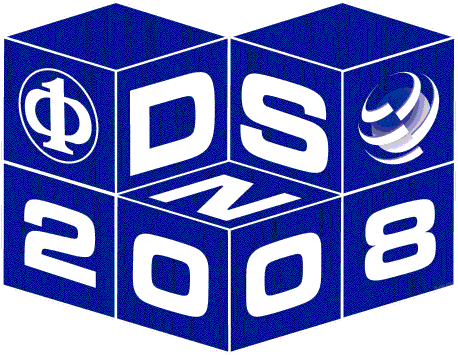Home
Program
Workshops
Tutorials
Student
Forum
Industry Forum
FastAbs
BoF
Excursion
Registration
Hotel
Location
Family
Tours
Call for
Contributions
Organizers
William Carter
Award
Previous Conferences:
DSN
2007
DSN
2006
DSN
2005
DSN
2004
DSN
2003
DSN
2002
DSN
2001 |
Birds of a Feather
(BoF) Sessions at DSN 2008:
BoF #1
Key Dependability Issues and Future Directions for Research in the Area of
Computing with Cell Phones
Shivakant Mishra, Department of Computer Science, University of Colorado
There are 1.5 billion cell phones in the world today, more than three times
the number of PCs. Already, these cell phones can be used to browse the web,
take pictures, send emails and play games. Indeed, with our cell phones getting
smarter and faster and with the development of mobile operating systems like
Android, cell phones are turning into the next computer. The field of computing
with cell phones is at its infancy at the moment. Accordingly, the research
challenges in building interesting applications using cell phones are fresh and
in many cases still unknown. The goal of this BOF session is to identify key
dependability issues and future directions for research in the area of
computing with cell phones. In particular, questions such as "What are the
key research challenges in distributed computing using cell phones?";
"Are there any fundamentally new dependability challenges in computing
with cell phones?"; and "How is distributed computing with cell
phones different from other forms of distributed computing?" will be
discussed.
Bof #2
Reliability Issues and Opportunities for Multicore, Multithreaded
Microprocessors
Alan Wood and Ishwar Parulkar, Sun Microsystems, USA
In the industry's never-ending quest to maximize computer system
performance, two complementary trends have recently emerged: multicore and
multithreaded microprocessors. Multicore microprocessors use the increasing
number of transistors more efficiently, both for higher performance and for
lower power consumption. Multithreaded microprocessors take advantage of thread
level parallelism to keep the multiple cores highly utilized. In this BOF
session, the participants will discuss (1) potential reliability issues with
multicore, multithreaded microprocessors, (2) inherent reliability improvements
due to multicore, multithreaded microprocessors, and (3) opportunities to use
multicore, multithreaded microprocessors to improve reliability.
Bof #3
Education in Resilient Computing Systems: why and how?
Jean-Claude Laprie (LAAS-CNRS, France) and Luca Simoncini (University of
Pisa, Italy)
The European Network of Excellence ReSIST (Resilience for Survivability in
Information Society Technologies) gathers more than 180 researchers and
doctorate students, from 14 academic institutions and 4 industrial companies,
from 8 countries. The ReSIST rationale addresses the gap in dependability and
security between dedicated, fault-tolerant systems, and commodity-oriented
systems (such as the Web). During its first two years of existence, ReSIST has
produced, among many outputs, a state of knowledge in resilience-building
technologies, a research agenda in resilience-scaling technologies, a knowledge
base in resilient computing, and a curriculum in resilient computing. A
courseware is currently being built.
After a brief overview of the ReSIST activities, the birds of a feather
session will focus on the curriculum and courseware issues: why proposing and
promoting such a curriculum? How to organize it, and which courseware should be
attached to it? How and at which level to deliver the corresponding education?
The resilience knowledge base, which plays a prominent role in information
gathering and dissemination (including for education) will also be
demonstrated.
Call for Proposals Birds of a Feather
(BoF) Sessions at DSN 2008:
We are pleased to announce that the 2008 Dependable Systems and Networks
Symposium (DSN 2008) will, for the first time, feature "Birds of a
Feather" sessions, to be held on Wednesday evening, June 25, 2008.
A Birds of a Feather (BoF) session provides a gathering place and discussion
forum for those interested in the same issues and concepts. BoFs can be
organized for sharing ideas on the specific topics, narrow or broad.
These are not workshops or sessions where people present papers, but open,
"brainstorming" forums for attendees who want to get together with
others to share their current interests, goals, technology, environment, or
backgrounds.
BoFs are popular because of their interactive and flexible format and the
fact that they offer attendees and technology experts an opportunity to
interact at a peer level.
If you want to organize and run a Birds of a Feather session, please send me
a descriptive proposal by 7 April 2008.
Topics will be evaluated on the basis of their promise to engage a
significant number of the conferences participants in a fruitful discussion.
Possible examples include:
- Reliability and security of critical infrastructures, e.g., power grid
- Multi-core processor architectures: opportunities and challenges from the
reliability and security perspective
- Virtual machines: reliability and performance tradeoffs or how to avoid
virtual machines to become a single point of failure?
- Fault-tolerance challenges in large server clusters
- Adaptation and self-organization in ubiquitous computing
While we would welcome BOF organizers for the above topics, the purpose of
this CFP is to ask *you* to propose topics around which a community of
interested researchers would coalesce at DSN. We are explicitly not looking for
marketing or recruiting sessions; however, commercial entities are encouraged
to propose sessions on current technical issues.
Bob Swarz:
Email: [email protected]
Telephone: +1 781-271-2847
Fax: +1 508-258-1124
|
